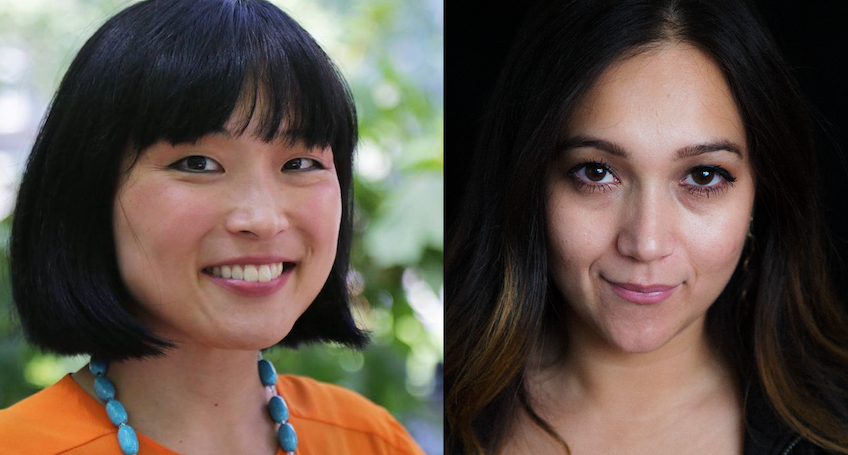Close to 1,500 Asian American Journalism Association members descended on Austin for AAJA’s 2024 National Convention, where they explored everything from covering the upcoming election to the ethics of AI in journalism to the challenges of reporting on growing Asian American Pacific Islander (AAPI) communities in Texas.
The AAJA convention barely affected the sun-baked streets of a city accustomed to hosting tens of thousands of visitors for the annual SXSW conference. But inside the Hilton Austin, meeting rooms and hallways were filled with AAPI journalists from across the country, catching up with old friends and making new connections.
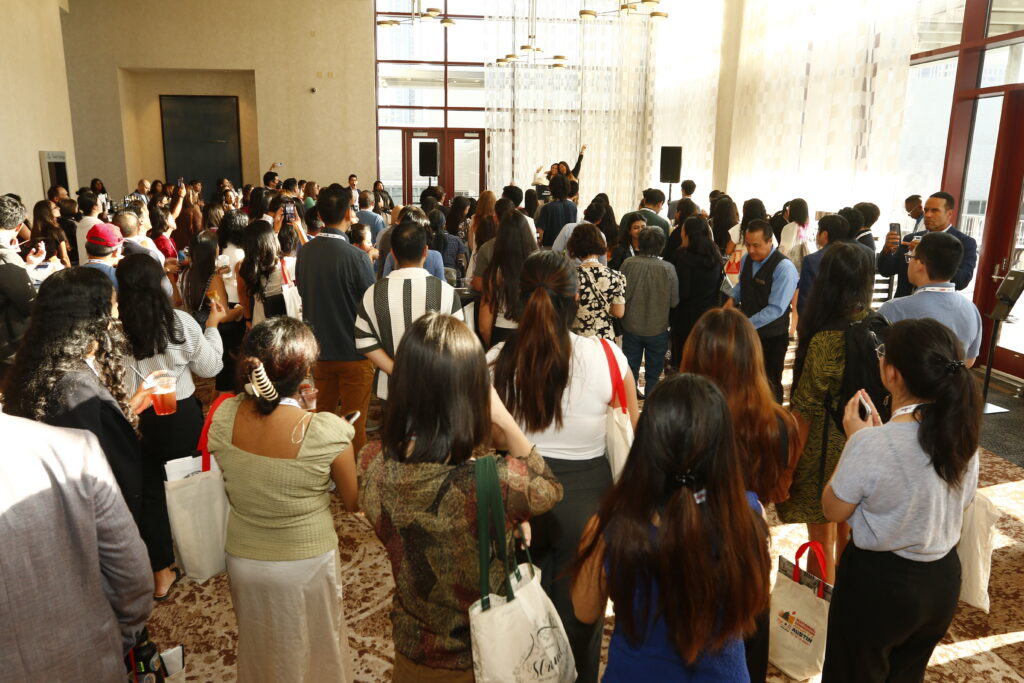
A full house at AAJA’s 2024 Opening Reception on Wednesday, August 7, where Natalie Hee and Tiffany Liou welcomed attendees to Austin. Photo by Darrell Miho.
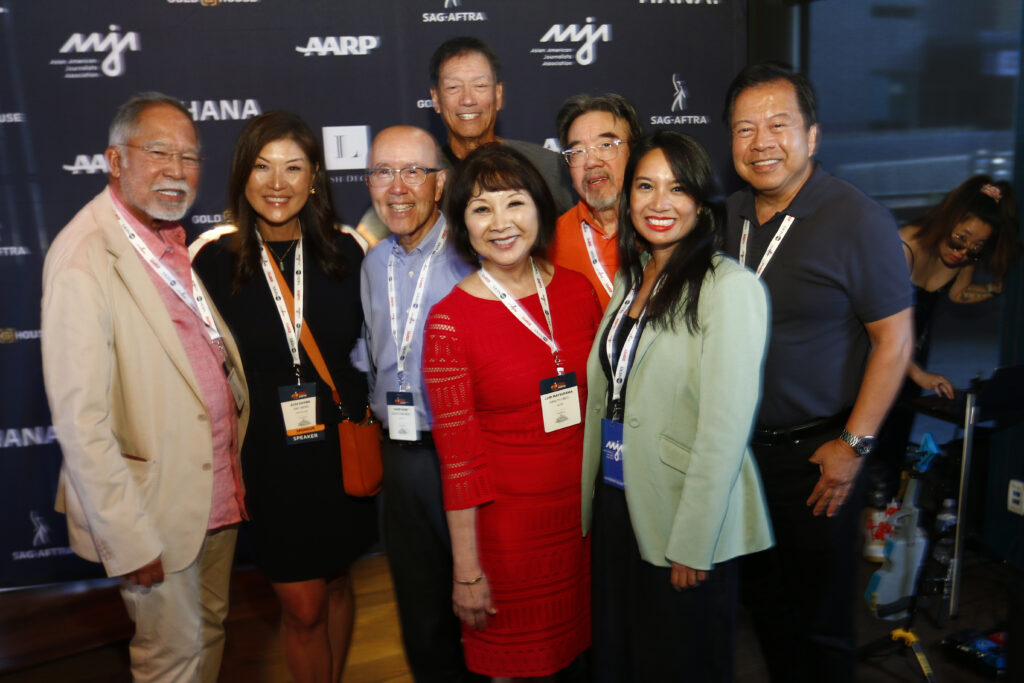
(L-R) Lloyd LaCuesta, Juju Chang, David Louie, Lonnie Wong, Lori Matsukawa, Al Young, Nicole Dungca and Rick Quan attend AAJA Broadcast Task Force’s reception on Friday, Aug. 10. The Broadcast Task Force published their report, “The State of Asian American Female and Male TV Broadcasters,” on Tuesday, Aug. 6. Photo by Darrell Miho.
Along with dozens of skill-building sessions, there was inspiration. At the gala, barrier-breaking broadcaster Connie Chung sat down for a fireside chat with ABC Nightline anchor Juju Chang, one of many AAPIs who saw her own future in journalism when she watched Chung anchor the CBS Evening News.
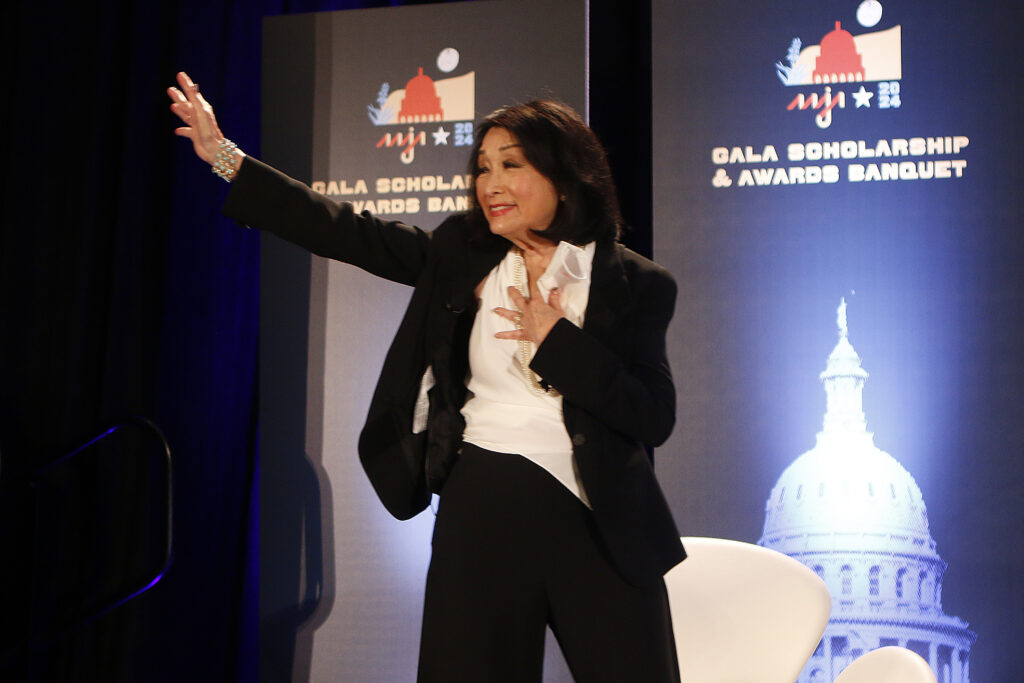
Connie Chung enters the room to a standing ovation with over 600 journalists at AAJA’s 2024 Gala Scholarship and Awards Banquet. Photo by Darrell Miho.
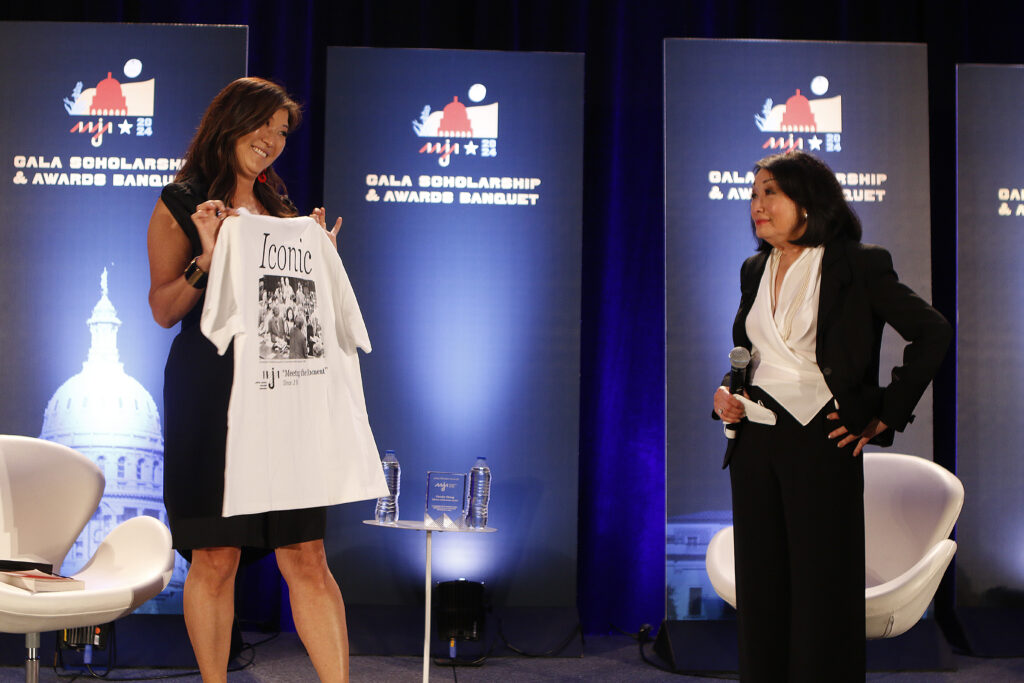
Juju Chang, ABC Nightline anchor, proudly displays an “Iconic Connie Chung” shirt during AAJA’s Gala before a fireside chat with Connie Chung on Saturday, Aug. 11. Photo by Darrell Miho.
Chung’s road to becoming an Asian American icon was a rough one, as she said she had to endure sexism, racism, and innuendo from men who had “delusions of sexual prowess.” She toughed it out and focused on her journalism, so much so that when she submitted the first draft chapters of her upcoming memoir, “Connie,” her editor told her that she couldn’t just report the facts she had to include some emotion.
“What do you mean, ‘what am I feeling?’” she quipped, eliciting knowing laughter from a room of journalists, a profession that has only recently started acknowledging the emotional impact of covering news events, especially ones that hit close to home, like the anti-Asian violence and hate that surfaced during the pandemic.
AAJA awarded Chung a Lifetime Achievement Award, while AAJA President Nicole Dungca presented Chang with the President’s Award, recognizing both her professional success and her generous mentorship of young AAJA members. The AAPI Visibility Award went to Viet Thanh Nguyen, whose debut novel “The Sympathizer” won the Pulitzer Prize and was made into an HBO series.
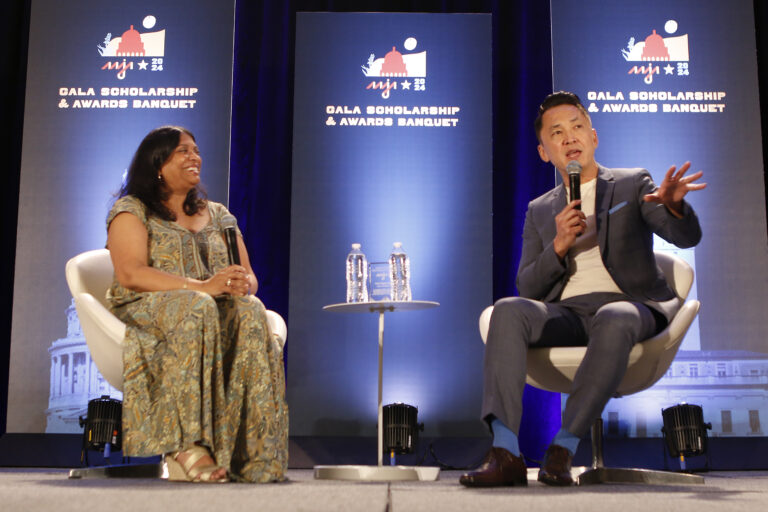
Viet Thanh Nguyen, Pulitzer-Prize winning author of The Sympathizer, sits down with Niala Boodhoo, host of Axios Today, to discuss the impact of AAPI storytelling. Photo by Darrell Miho.
Nguyen called himself “a defiant storyteller” because he set The Sympathizer among California’s Vietnamese exile population, reclaiming the narrative of America’s war in Vietnam for Vietnamese who experienced it. The first 14 publishers rejected the manuscript, said Nguyen, who has since written several other books and teaches at the University of Southern California.
AAJA announced the full list of 2024 Community Awards recipients at the conference, including Member of the Year and Chapter of the Year, and also honored the year’s Journalism Excellence Award recipients, many of whom produced stories that would have gone untold without the cultural competence that AAPI journalists bring to their jobs.
AAJA National Board election results were also announced at the conference: Dungca, a Washington Post investigative reporter, will continue in that leadership role in 2025-26, while Marian C. Liu, a Post editor, was reelected as Vice President of Civic Engagement in a contested race. Chris Nguyen, Scripps’ national anchor, will be AAJA’s next Vice President of Finance. Half of AAJA’s National Board officers stand for election each year.
Dungca immediately focused on AAJA’s future, announcing the launch of an endowment campaign that will ensure that AAJA can pursue its mission as long as necessary. In introducing the Futures Fund, Dungca testified how AAJA’s support was pivotal at every step of her career and called for 100 donors to step up in the first 48 hours. A total of 237 answered the call.
Simon and June Li are two AAJA supporters who have already answered the call to invest in the future. AAJA announced a gift in their name that will allow the organization to upgrade its signature Executive Leadership Program (ELP), make ELP more accessible, and allow selected ELP graduates to attend the top journalism leadership programs in the nation. Applications for the Simon and June Li Leadership Transformation Fellowship are open now.
Another convention milestone was the launch of the updated AAJA Style Guide at a well attended morning session. The interactive guide, the culmination of two years of work by more than 50 AAPI journalists across the country, will be a powerful tool for fair and accurate coverage of the AAPI community, which is often treated as a monolith but actually comprises more than 50 ethnic groups. It identifies terms from “illegal immigrant” to “kamikaze drone” that are imprecise and potentially harmful.
The theme of this year’s convention was “Meeting the Moment.” There were several sessions exploring the use of AI in the newsroom, everything from the ethics, to its role in misinformation, and its power in multimedia production. All were full. Another packed session was on covering the Israel-Gaza conflict, with three panelists successfully connecting via video screen, always a logistical feat.
Several other panels focused on aspects of covering the 2024 election. Many of the issues forming national faultlines are starkly visible in Texas, from immigration to abortion bans. The Texas Tribune’s CEO, Sonal Shah, and former editor-in-chief, Sewell Chan, hosted a session on Texas issues and the art of covering the state capital. Another session focused on the challenges of covering the South Asian community in Texas; Asians are the fastest growing group both in Texas and nationwide.
It was not all about politics. The convention also focused on bringing the community together and lifting fellow journalists up, from a session entitled “Am I good enough?: Boosting self-confidence and morale in this industry” by AAJA’s Young Professionals Network Affinity Group to a listening session with Muslim American Journalists and a wellness room available throughout all conference days. These many sessions and spaces were created through collaborations with AAJA’s Affinity Groups and partners.
Books by AAJA members highlighted and sold at the convention’s Expo Hall pop-up included “Corky Lee’s Asian America: Fifty Years of Photographic Justice.” Also, Helen Zia’s “Last Boat Out of Shanghai.” Others were “Brave Mrs. Sato“; “The Golden Screen: The Movies that Made Asian America;” “Inside the Mirror: A Novel;” mental health resource “How K-Dramas Can Transform Your Life;” and “Far from the Rooftop of the World: Travels among Tibetan Refugees on Four Continents.”
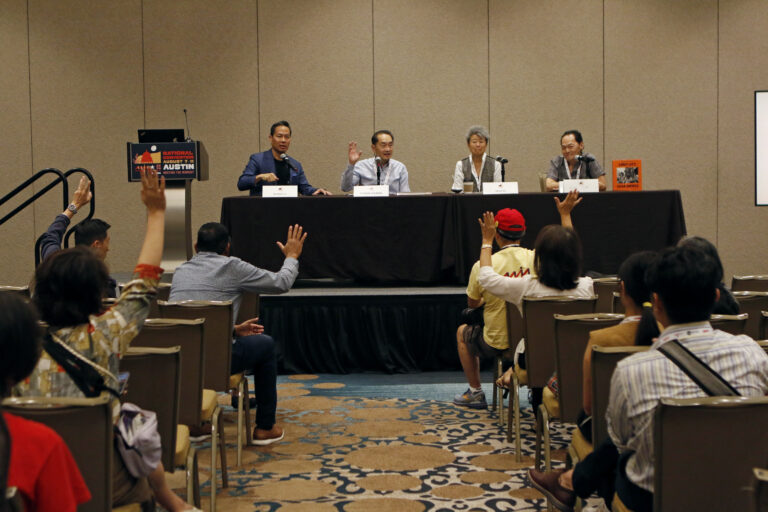
Attendees raise their hands during a Q&A for a session titled, “Seeing Ourselves: How Corky’s Camera Captured the Attention of the World” honoring the late “Undisputed, Unofficial Asian American Photographer Laureate” and longtime AAJA member Corky Lee. Photo by Darrell Miho.
The convention was also an opportunity to bring together AAJA members who are nonprofit news leaders. The first gathering, three years ago, was small – this year close to 50 news leaders and funders joined, reflecting that the nonprofit news sector, defined by membership with the Institute for Nonprofit News, has grown to more than 450 publications, employing more journalists than the country’s biggest newspaper group.

News leaders from across the country gather on Friday, August 9. AAJA’s nonprofit news leaders summit has become an annual event at conventions since the first gathering in 2022. Photo by Darrell Miho.
Participants shared tips on generating revenue, underlining that nonprofit can simply mean multiple revenue streams. They also talked about the need for transparency among journalism support organizations, so they know where to turn.
Top executives also noted that AAPI leaders still lack a safety net, in a country where white executives routinely fail upward. Can AAJA help build the network, extending beyond journalism, that allows AAPI leaders to take risks that are potentially transformative?
Organizing an AAJA convention is challenging. How to program for early, midstage and senior journalists? Television, and everything else? Commercial or nonprofit? AAJA member S. Mitra Kalita acknowledged the challenges in a LinkedIn post and concluded: “Somehow this convention managed to check all of these boxes and more. I felt challenged and energized but somehow affirmed at every turn.”
The convention was possible thanks to Presenting Sponsor ABC News/ESPN. NBCUniversal and CNN/TNT Sports were Diamond Sponsors, and CBS News and Stations and FOX were Ruby Sponsors, showing their commitment to diversity in news. AAJA is grateful to the many sponsors who supported the convention and participated in the expo, recruiting journalists who can fluently tell the story of our country’s diverse future.
To top it all off, #AAJAFamily came together in a full-circle moment to conclude AAJA 2024’s gala. Emcee Jason Nguyen proposed onstage to his co-emcee, Rosie Nguyen in front of friends, family and close to 700 AAJA gala guests. For the record, she said “yes.”
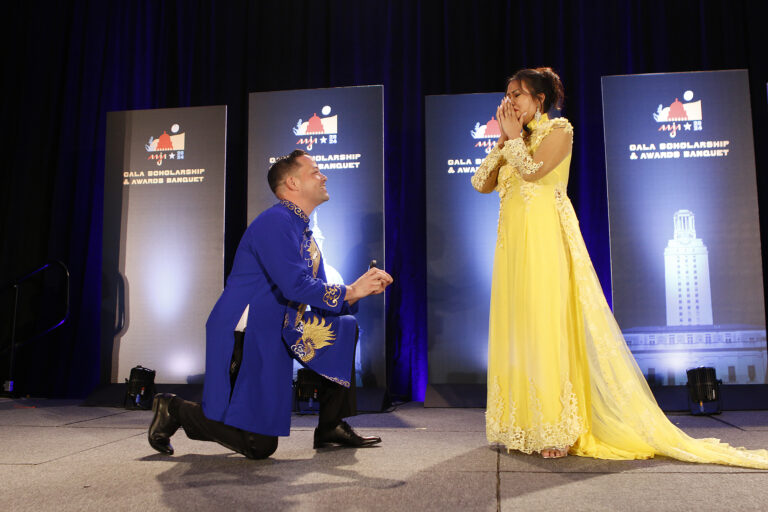
Jason Nguyen, senior investigative producer at KPRC, proposes to Rosie Nguyen, race and culture reporter for KTRK in Houston, at AAJA’s 2024 Gala Scholarship and Awards Banquet on Saturday, Aug. 11. Photo by Darrell Miho.


